

Deleuze&Guattari. Kick-ass Deleuze & Guattari introduction!!! « Tusen pekpinnar. Gilles Deleuze. Weizman_lethal%20theory. Rhizome « The Chicago School of Media Theory. Overview: In media theory, rhizome is an evolving term that stems from the theories of Gilles Deleuze and Felix Guattari.
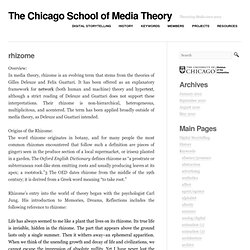
It has been offered as an explanatory framework for network (both human and machine) theory and hypertext, although a strict reading of Deleuze and Guattari does not support these interpretations. Their rhizome is non-hierarchical, heterogeneous, multiplicitous, and acentered. The term has been applied broadly outside of media theory, as Deleuze and Guattari intended. Origins of the Rhizome: The word rhizome originates in botany, and for many people the most common rhizomes encountered that follow such a definition are pieces of ginger1 seen in the produce section of a local supermarket, or irises2 planted in a garden. Rhizome’s entry into the world of theory began with the psychologist Carl Jung. Life has always seemed to me like a plant that lives on its rhizome.
Deleuze and Gauttari arrive at the rhizome by way of analyzing the book. 4 Jung, C.G. Rhizome. Rhizomes, Memory, Deleuze and Guattari. « Eidetic Traces. January 25, 2010 by Catherine Borders Gilles Deleuze and Félix Guattari criticize psychoanalysis for its reduction of everything to a fundamental Oedipal triangle (Daddy, Mommy, and Me).
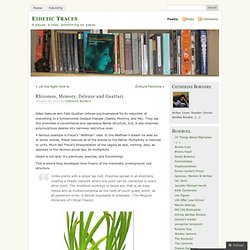
They say this promotes a conventional and repressive family structure, but, it also channels polymorphous desires into narrowly restrictive ones. A famous example is Freud’s “Wolfman” case. In the Wolfman’s dream he sees six or seven wolves, Freud reduces all of the wolves to the father. Multiplicity is reduced to unity. Desire is not lack! This is where they developed their theory of the rhizomatic underground root structure. Unlike plants with a single tap root, rhizomes spread in all directions, creating a chaotic network where one point can be connected to every other point.
It is never the beginning or the end that are interesting; the beginning and the end are points. I think the same of memory. This was the quite literal bane of Mahood’s existence in The Unnamable. “I can’t go on. Like this: Rhizome (philosophy) "As a model for culture, the rhizome resists the organizational structure of the root-tree system which charts causality along chronological lines and looks for the original source of 'things' and looks towards the pinnacle or conclusion of those 'things.' A rhizome, on the other hand, is characterized by 'ceaselessly established connections between semiotic chains, organizations of power, and circumstances relative to the arts, sciences, and social struggles.' Rather than narrativize history and culture, the rhizome presents history and culture as a map or wide array of attractions and influences with no specific origin or genesis, for a 'rhizome has no beginning or end; it is always in the middle, between things, interbeing, intermezzo.'
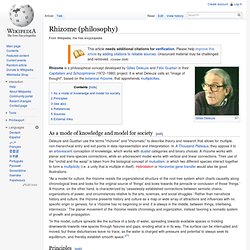
Deleuzeguattarirhizome. What is a rhizome, anyway? : invisibletransmission. Iris Rhizome. Image from Rhizome is a term that originates in botany. Rhizome Theory, according to Deleuze and Guattari : invisibletransmission. One of the challenges that I highlighted in my research proposal is that it will likely be difficult to keep the structure of this project from deviating towards a hierarchical, or tree-like, model.

It’s very easy to slip – Western minds naturally want to follow a hierarchical, ontological thinking process. Rhizomatic Education : Community as Curriculum. Below is my paper as it appears in Innovate – Journal of Online Education.
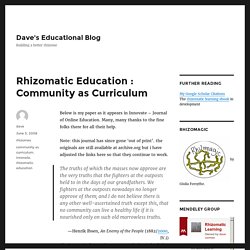
Many, many thanks to the fine folks there for all their help. Note: this journal has since gone ‘out of print’. the originals are still available at archive.org but i have adjusted the links here so that they continue to work. The truths of which the masses now approve are the very truths that the fighters at the outposts held to in the days of our grandfathers. We fighters at the outposts nowadays no longer approve of them; and I do not believe there is any other well-ascertained truth except this, that no community can live a healthy life if it is nourished only on such old marrowless truths.
—Henrik Ibsen, An Enemy of the People (1882/2000, IV.i) Knowledge as negotiation is not an entirely new concept in educational circles; social contructivist and connectivist pedagogies, for instance, are centered on the process of negotiation as a learning process. On Knowledge. 15. The Postmodern Psyche. Postmodern Theory - Chapter 3: Deleuze and Guatari. Chapter 3: Deleuze and Guattari: Schizos, Nomads, Rhizomes We live today in the age of partial objects, bricks that have been shattered to bits, and leftovers...
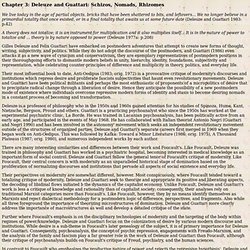
We no longer believe in a primordial totality that once existed, or in a final totality that awaits us at some future date (Deleuze and Guattari 1983: p.42) A theory does not totalize; it is an instrument for multiplication and it also multiplies itself... It is in the nature of power to totalize and ... theory is by nature opposed to power (Deleuze 1977a: p.208) Gilles Deleuze and Felix Guattari have embarked on postmodern adventures that attempt to create new forms of thought, writing, subjectivity, and politics.
Their most influential book to date, Anti-Oedipus (1983; orig. 1972) is a provocative critique of modernity's discourses and institutions which repress desire and proliferate fascists subjectivities that haunt even revolutionary movements. Their perspectives on modernity are somewhat different, however. Deleuze and Guattari, "Rhizome" annotation by Dan Clinton.